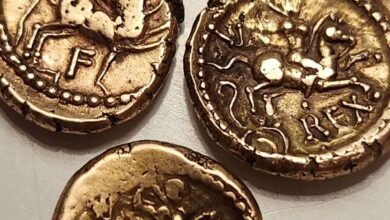Treasure finds lost Bronze Age sword in Dorset
John Belgrove, 60, had separated from the main group of detectorists and was on his way to higher ground to search for them when he made the “discovery of a lifetime.”
His device activated as he walked and as he dug deeper he uncovered a complete rapier sword dating to 1400 BC.
The 60 cm long relic made of copper bronze was intentionally broken into three pieces and placed in the ground next to the ashes of a wealthy landowner.
The hilt was unusually cast in bronze and shaped like a wooden handle, and bore similarities to the solid cast handles of Norse swords from Scandinavia, although it was another 2,100 years before the Vikings arrived in Britain.
To date, only two similar rapier swords have been found in Britain, and they were incomplete.
In addition to the rare rapier, a palsta axe and a decorative bracelet were also given as offerings during the ceremonial burial.
The treasure was of such national importance that the British Museum wanted it.
In the end, the Dorset Museum in Dorchester raised £17,000 for the purchase, with John and the landowner sharing the proceeds.
The treasure was found in the village of Stalbridge in 2020.
John, a retired pensions adviser from Purley, Surrey, paid £20 to attend the rally on private farmland.
He said: “There was a group of 40 to 50 detectorists there. They had searched the area before but were excited because new land had been opened up for the rally.
“I went along and didn’t know anyone there. Somehow I got left behind and lost, so I went to a hill in a field and there I got a strong signal of the find of a lifetime.
“It was clear there was metal there, but I thought it was just an old can or something.
“I dug about 20 centimeters deep and found a strangely shaped object encrusted with clay.
“I didn’t know what it was at the time, but it turned out to be the handle of a sword, an extraordinary object.”
He then found the two broken pieces of the blade as well as the axe and the bracelet.
John said: “When I saw the axe I knew it was a Bronze Age treasure. They are quite common.
“I was dizzy.
“This was a single deposit made by or on behalf of a high status individual at the time.
“The blade of the sword was still sharp. According to the British Museum, it was deliberately broken and deposited in the ground as part of a ritual burial and offering.”



